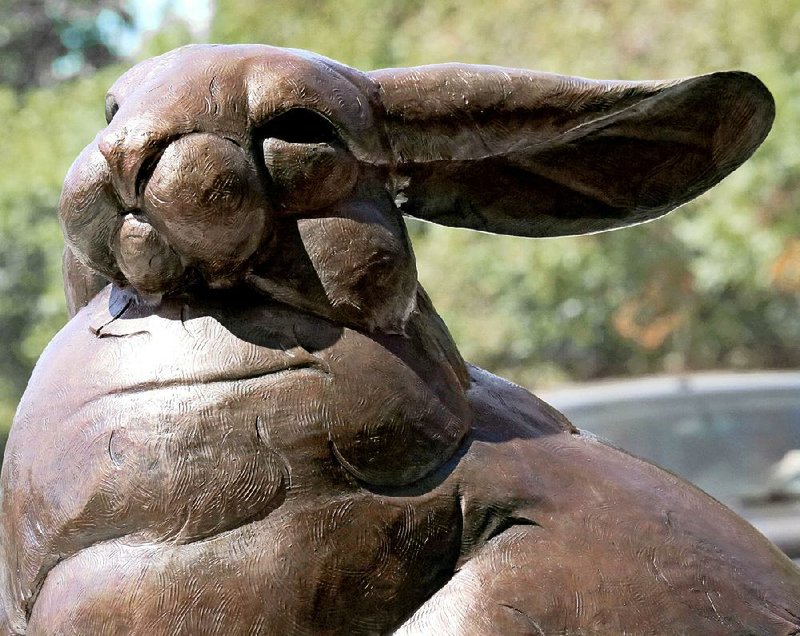Lift the eyelids, one at a time. Behold: the dawn of a new year, no mistakes in it yet.
Squint, if necessary.
Where to start?
Some people say, "Rabbit, rabbit" — to the ceiling or the mirror or to first person they meet. Or they pretend it's the first thing they've said by making it the first thing they post to social media.
This custom is not of recent invention, nor does it appear to have originated in Arkansas. It is folklore of foggy origin, likely English or more generally European.
Neva Barker was in high school in the early 1970s when she learned about saying "rabbit, rabbit" or "rabbit, rabbit, rabbit" on the first day of the month for good luck. A teacher or other students at Mount St. Mary Academy in Little Rock got her started doing it.
She doesn't recall whether it was in Mme. Theresa Simon Grillo's French class or Karen Flake's English class, because when she remembers to say or post "rabbit, rabbit, rabbit" she also remembers the French for rabbit, "lapin."
"My memory was that we said, 'Lapin, lapin, lapin' in class, but maybe I added the third one, like birthday spankings with one to grow on," says Barker, who is director of international study programs at Scripps College in Claremont, Calif. "For some reason it caught my fancy, and I have tried to remember to say it first thing at the first of every month."
Why? Most of the time, simply because it makes her happy. But "on occasion it makes me feel relief to remember to say it.
"Relief comes from the feeling that, anything that goes wrong that month, it will not be because I forgot to say, 'Rabbit, rabbit, rabbit.'"
She thinks it's comforting to believe in magic. "It is the less tyrannical version of picking a set of lottery numbers that have personal meaning to you and then feeling pressure to buy a ticket with those numbers every time because what if those numbers eventually win?"
While growing up in North Little Rock, Barker's former classmate Mary Engel said two rabbits — not three — on the first day of the month, for luck. "I did (and, um, still do) ... And, OK, truth be told, I say, 'Bunny, bunny.'" Her mother embroidered a little bunny on her flannel sheet, to help her remember. And she developed her own mythology, that the bunnies should be spoken on New Year's Day, the first day of one's birth month and the month in which Easter occurs.
A staff writer for the Fred Hutchinson Cancer Research Center's Fred Hutch News Service in Seattle, Engel likes getting to the bottom of things. A few years ago, she noticed a friend had posted "Rabbit, rabbit" on Facebook, and "became obsessed" with where it came from. This was before the Wikipedia page that today is a primary source for endlessly aggregated news reports.
A little Googling took her to a Trixie Belden novel, The Mystery of the Emeralds (Golden Press, 1965), part of a popular detective series aimed at ages 8 to 12. She was a big Trixie fan as a child. "So I think that must have been my source, though where Trixie got it remains a mystery."
WHAT TRIXIE DID
The Mystery of the Emeralds opens with the young sleuth waking up to a large sign tied to the foot of her bed. She yells "Rabbit! Rabbit!" before dashing down the hall to her brothers' room. Brian draws the covers over his head and turns "thumpily" toward the wall, but Mart sits up, excited. A little brother, Bobby, wanders in, drawn by the rumpus. Trixie picks him up and whirls him around.
"Then, plunking herself down on Brian's bed, she said, 'Well, ever since I was Bobby's age I've been trying to remember to say "Rabbit! Rabbit!" and make a wish just before going to sleep on the last night of the month. If you say it again in the morning, before you've said another word, your wish comes true.'"
TIMES CHANGE
Suddenly she worries that the reminder she hung on her bed might have foxed her luck. Gleeps! What did she wish for? Another mystery to solve, because little Sleepyside seems — "well, a little pallid."
Mart warns her to watch out for ennui. (No, really. All 12-year-olds knew that word in 1965.)
Engel isn't alone in preferring bunnies. Comedian Gilda Radner (1946-1989) did, too, according to Alan Zweibel's Bunny, Bunny: Gilda Radner, a Sort of Romantic Comedy (Villard, 1994).
In 2008, a member of the bunny tribe from Maine called in to the NPR show A Way With Words seeking guidance on how to do it right. (This episode is archived at waywordradio.org, see https://www.waywordradio.org/cruciverbalists-play-across-and-down/.) She had been taught by her family to say "bunny, bunny." But in college, her roommate from an old-money East Coast family pityingly informed her it had to be "rabbit, rabbit." No wonder her family had only the new money.
A joke. But in some tellings, the superstition has teeth.
It was used against Amie Regester by one of her schoolmates in Greenbrier. Today she's an evangelist with Central California Conference of Seventh-day Adventists in Clovis, Calif., but in 1994, Regester was a ninth-grader whose family had just moved to Faulkner County.
"It was my first few weeks here and someone with a thick country accent said it. I just said, 'What about rabbits?' She explained that she had just stolen all my good luck. I didn't believe it or anything, but I asked how I could get it back. She said it was impossible, but I could steal someone else's.
"That same girl annoyed me nearly every month with her luck-swiping double bunny obsession."
THUMPED
Tom Barron of Maumelle says that he was educated by a different literary work, humorist David Sedaris' memoir Theft by Finding: Diaries (1977-2002) (Little, Brown and Co., 2017).
Under "May 8, 2000," Sedaris writes that he picked up the practice from a friend in 1976 and that "it has to be the first thing that comes out of your mouth and you have to say it out loud or else it doesn't work."
He made a point to follow his friend's example, and so "everything I have can be attributed to 'Rabbit, rabbit,'" including his boyfriend, Hugh Hamrick, who took it up after they met. "This is a big help, as he's got a good head for dates and is always the first one to wake up. He says, 'Rabbit, rabbit,' I repeat it, and then I go back to sleep, confident that I'll be safe for another 30 days."
But one first day when he was visiting his sister, Amy Sedaris, he woke up to find her pet rabbit, Tattle Tail, chewing his eyelashes. "Rabbit, rabbit" were not the first words out of his mouth.
"Hence," he writes, "the kidney stone."
RABBIT OF THE MONTH CLUB
Arkansas Business Editor Gwen Crownover Moritz posts "Rabbit rabbit" on her Facebook page monthly, and her friends post it too, tagging her.
"I've done it all my life," she says. "Learned it from my mother, whose family did it. And I've introduced a lot of people to the custom on Facebook."
Melissa Blevins Wilcoxson, co-owner of Little Rock Climbing Center, says she holds with those who invoke three rabbits. "We do it — rabbit, rabbit, rabbit — but I don't have a sweet story for why. I did have a boyfriend in high school whose family said 'white rabbit' for some reason."
Variations range far beyond the number of rabbits. According to lexicographer Grant Barrett, co-host of the National Public Radio show A Way With Words, saying "white rabbit" or "white rabbits" is the more ancient custom. Another variation insists that you pull a hair out of your head and then punch someone nearby.
Also, you must climb out the end of the bed, not the side.
For the record, no harm befell Simon Winchester, author of 14 books including The Professor and the Madman (Harper Perennial, 2005), when he accidentally forgot his lagomorphic locution. He confessed to the world in a New York Times op-ed essay that after 60 years of devout practice, he had forgotten to say "white rabbits" on Oct. 1, 2006.
The British author, an authority on the making of the Oxford English Dictionary, had 696 faultless months to his credit.
"My mother, tucking me into bed one night, told me to do it, to bring good fortune; and since I have enjoyed fair good fortune for all of my subsequent days I have assumed that the acceptance of this moderate and harmless habit has had something to do with it, and so has reinforced my need to keep up the practice," Winchester wrote.
"Besides, it is an ancient and thoroughly English conceit: old folk in Yorkshire and Cornwall speak of it having been practiced for many centuries (though the first O.E.D. citation of anything similar is 1920)."
The custom is not universal in Great Britain, witness the testimony of Gary Taylor, owner of Go! Running in Little Rock, who grew up in western London. He was not taught to safeguard luck by mentioning rabbits. Instead, it was:
Pinch and a punch it's the first of the month,
A pinch and a kick for being so quick.
A poke in the eye for being so sly.
Somehow, the rabbits had "hopped the pond" by the early 20th century, as radio lexicographer Barrett told the caller who reported her toney roommate to A Way With Words.
In a different and more widely quoted interview, Barrett's co-host Martha Barnette told another NPR show that in some versions of the superstition, there's hope for the forgetful: If you miss your matutinal rabbits, simply say "black rabbit" right before you go to sleep.
Or say "tibbar, tibbar," which is rabbit spelled backward.
So, no, you have not necessarily already ruined the year 2018 by failing at rabbits.
You're welcome.
ActiveStyle on 01/01/2018

